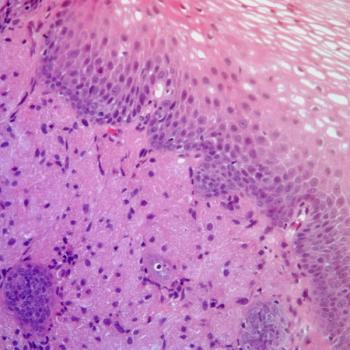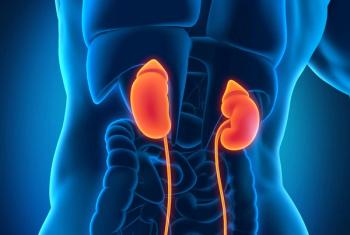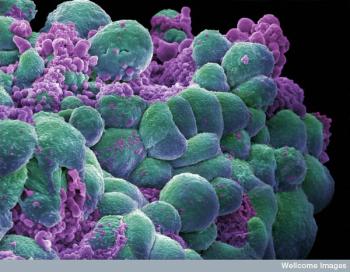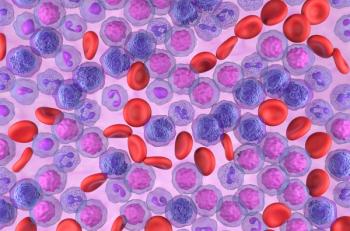
Future research will focus on ctDNA dynamics change over time in the full translational cohort of patients with hormone receptor–positive breast cancer in the phase 3 monarchE study, says Stephanie L. Graff, MD.

Your AI-Trained Oncology Knowledge Connection!


Future research will focus on ctDNA dynamics change over time in the full translational cohort of patients with hormone receptor–positive breast cancer in the phase 3 monarchE study, says Stephanie L. Graff, MD.

Results from a long-term analysis of the phase 3 IMCgp100-202 trial indicate that tebentafusp results in better disease control and long-lasting responses in those with HLA-A*02:01–positive, previously untreated metastatic uveal melanoma.

The FDA lifts its hold on a clinical program for lacutamab in lymphoma after a fatal adverse effect in the phase 2 TELLOMAK trial is determined to be related to aggressive disease progression.

Findings from a phase 3 trial highlight regression of central nervous system metastases across all heavily pretreated breast cancer subtypes with Bria-IMT.

Findings from a National Cancer Database analysis highlight no statistically significant differences in survival outcomes with chemotherapy for patients over 81 years old with triple-negative breast cancer compared with those who do not receive chemotherapy.

GPRC5D may be a promising therapeutic pathway in the treatment of those with relapsed/refractory multiple myeloma, says Susan Bal, MD.

Sugemalimab is now approved for managing esophageal squamous cell carcinoma in China following results from the phase 3 GEMSTONE-304 study.

Data from a phase 2 trial support the potential survival benefit of CAN-2409 plus prodrug for patients with borderline resectable pancreatic ductal adenocarcinoma.

An analysis based on the phase 3 TRANSFORM and TRANSCEND trials shows an increase in cost-effectiveness, life-years, and quality-adjusted life-years compared with standard of care in patients with relapsed/refractory diffuse large B-cell lymphoma.

Data from the phase 1b MonumenTAL-2 trial support pomalidomide plus talquetamab as a promising treatment option in relapsed/refractory multiple myeloma, says Jeffrey Matous, MD.

Combining olverembatinib with blinatumomab appears to produce high complete molecular remission rates in patients with newly diagnosed, Philadelphia chromosome–positive acute lymphoblastic leukemia, says Elias Jabbour, MD.

Patients with non–small cell lung cancer who already received LN-145 in the phase 2 IOV-LUN-202 trial will be followed per trial protocol following the FDA’s clinical hold.

A review from the FDA confirms the dose comparison post-marketing requirement that was detailed at the time of sotorasib’s accelerated approval for those with KRAS G12C–mutated non–small cell lung cancer.

A phase 1 clinical trial has found the optimal dosing schedule with a tolerable safety profile of vibecotamab in patients with relapsed/refractory acute myeloid leukemia.

Overall, the findings highlight the potential of bispecific antibodies as salvage therapy post anti-CD19 CAR T cell treatment and challenges associated with allogeneic hematopoietic cell transplantation consolidation after bispecific antibodies therapy in patients with relapsed/refractory B-cell lymphomas .


During a Morning Rounds discussion, experts in the field of renal cell carcinoma reviewed treatment updates and the effective use of immunotherapy plus TKIs.

Combining anastrozole with palbociclib, trastuzumab, and pertuzumab as a frontline therapy for hormone receptor–positive, HER2-positive breast cancer may avoid some of the toxicities associated with chemotherapy, says Amy Tiersten, MD.

Neil M. Iyengar, MD, gives new directions and ideas as he begins his new position as co–editor-in-chief of ONCOLOGY.

Kristen K. Ciombor, MD, MSCI, gives an overview of the current treatment landscape for patients with metastatic colorectal cancer.


Misako Nagasaka, MD, PhD, sheds light on neoadjuvant and adjuvant treatment options for patients with lung cancer.

During the European Society for Medical Oncology 2023, experts discussed updated results in key trials across the lung cancer space.

Patients with chronic lymphocytic leukemia in the ALPINE study previously treated with BTK inhibitors are likely to remain sensitive to other BTK-targeting agents, says Jennifer Brown, MD, PhD.

During a continuing medical education activity hosted by PER, Paolo Tarantino, MD, discussed HER2-low breast cancer and emerging treatment options to fight the disease.



Pirtobrutinib produces a high rate of responses in patients with relapsed chronic lymphocytic leukemia harboring baseline BTK mutations, according to findings from the phase 1/2 BRUIN trial.

The application for amivantamab and lazertinib for locally advanced or metastatic non–small cell lung cancer is supported by data from the phase 3 MARIPOSA trial.
